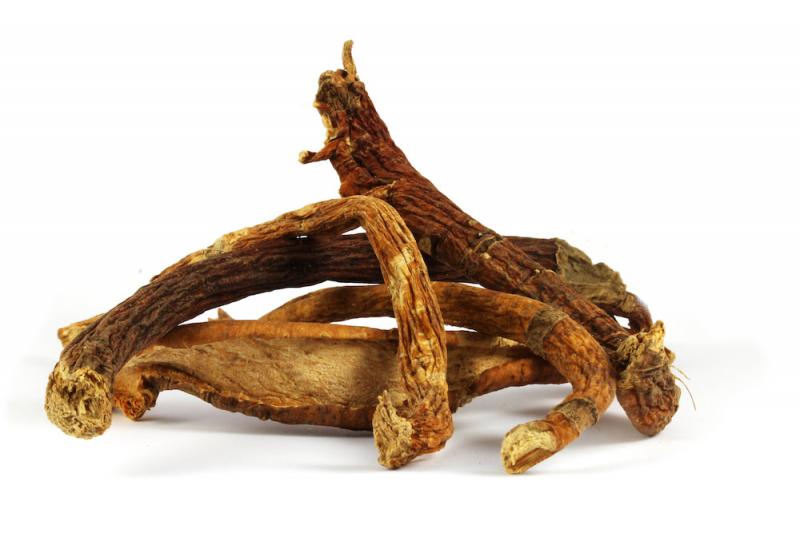
There is a long history of taking bitters with meals to improve digestion. When the Israelites were going out of Egypt, they were told to eat bitter greens with the Passover lamb. The practice of eating a salad at the beginning of a meal may have its roots in the idea that eating bitter greens at the beginning of a meal stimulates digestive secretions. This has carried over into the idea of taking herbal bitters as a tonic with meals to improve digestive function.
The oldest of these herbal bitters formulas is Swedish bitters, which is said to have been created by Paracelsus in the sixteenth century. Alcoholic bitters, such as Angostura bitters and underberg bitters, have been used to flavor cocktails but are also used to stimulate digestion. Today, there are many digestive bitters formulas sold by a variety of herb companies that one can take to improve digestion and general health.
Health Benefits of Bitters
Although a wide variety of compounds can be responsible for a bitter taste, all “bitter principles” in plants have some general actions because they all stimulate receptors for bitterness, which are not just found in the mouth, but also in the stomach, intestines, liver, and pancreas. These bitter receptors are much more sensitive than the receptors for the tastes of sweet, salty, and sour, because bitterness is often a sign of poison in plants.
Nevertheless, simple bitters, herbs that have a bitter taste but don’t have toxic effects, have some very important health benefits. Stimulation of the bitter receptors stimulates digestive secretions in the stomach, liver, and pancreas, aiding digestion of food. They also help stimulate the liver enzyme systems that detoxify the body. And, via the gut-brain connection, they can also help ease stress.
About Gentian
 There are about 400 species in the genus, Gentiana, but the one most commonly used in herbal medicine is Gentiana lutea. A native of Europe this classic simple bitter herb contains gentiopicrin, an iridoid compound that is considered one of the most naturally bitter substances known. It is detectable by the tongue in one part in 50,000 and is used as a base for the measurement of bitterness.
There are about 400 species in the genus, Gentiana, but the one most commonly used in herbal medicine is Gentiana lutea. A native of Europe this classic simple bitter herb contains gentiopicrin, an iridoid compound that is considered one of the most naturally bitter substances known. It is detectable by the tongue in one part in 50,000 and is used as a base for the measurement of bitterness.
Gentian is a classic ingredient in many traditional herbal bitters formulas, including the previously mentioned Swedish and Angostura bitters. It stimulates appetite and digestion, and is traditionally used for problems like gastritis, heartburn, nausea, gas, bloating, diarrhea, and constipation. It is also used where there are problems with the absorption of nutrients due to poor function of the digestive tract.
Gentian Flower Essence
Gentian is also one of the original Bach flower remedies, although a different species is used, Gentiana amarella. The emotional indications for gentian flower essence are also a good indication for its use as an herb. The person who needs gentian starts out being optimistic about the success of something but is easily discouraged following any setbacks or disappointments. In other words, they lack the ability to persevere.
They suffer from self-doubt and get depressed because they feel like a failure due to their lack of confidence in themselves. They don’t have the faith to continue a course of action when they face obstacles or challenges.
Gentian for the Discouraged Client
 This is an important indication because some people often have trouble with follow-through in natural healing. It can take a long time for certain health problems to develop and it can also take a period of time for them to resolve themselves. People need the faith to preserve with their health program if they want real results.
This is an important indication because some people often have trouble with follow-through in natural healing. It can take a long time for certain health problems to develop and it can also take a period of time for them to resolve themselves. People need the faith to preserve with their health program if they want real results.
Matthew Wood suggests it is indicated “when the client starts to ask repeatedly if the remedy is going to work and needs continual reassurance—even when they already feel better…” He says “They mistrust their instincts so they worry and look for confirmation from an outside source but usually jump to the wrong conclusion because they mistrust themselves.
Gentian for the Sensitive Appetite
Dorothy Hall paints a slightly different picture of the person who needs gentian. Anxiety, stress, or other difficulties cause this person to lose their appetite. They not only can’t eat, but they also have difficulty swallowing. The emotional stress causes them to lose all desire to eat because they’re unable to “stomach” what is happening to them.
Hall says, “For these people, more than any other person-type, peace around the dinner table and congenial relaxed surroundings are essential.” I can relate to that, since my stomach starts getting tied up in knots and I completely lose my appetite if people start arguing during mealtime. I also simply cannot digest food eaten on the run, even if it’s healthy food and not the unhealthy fast food.
Bitters, Digestion, and Life
 The emotional indications for gentian underscore the relationship between digesting life and digesting food. Life can bring us many bitter experiences. These experiences, especially deeply traumatic ones, can be difficult to mentally process and make sense of. In other words, some experiences are difficult to digest. And since a relaxed nervous system is necessary for good digestion, these undigested bitter experiences may make it difficult for us to digest food.
The emotional indications for gentian underscore the relationship between digesting life and digesting food. Life can bring us many bitter experiences. These experiences, especially deeply traumatic ones, can be difficult to mentally process and make sense of. In other words, some experiences are difficult to digest. And since a relaxed nervous system is necessary for good digestion, these undigested bitter experiences may make it difficult for us to digest food.
Bitter herbs, like gentian, can help a person learn to take the bitter along with the sweet in life. The problem is that herbs like gentian taste bitter, and it is the flavor of bitterness, not just the herb itself, that triggers the neurological responses that help a person digest food and the bad experiences of life. You won’t get the best benefits from gentian if you take it in a capsule. It needs to be in a liquid form, either as a traditional alcohol extract or as a glycerite.
Using Gentian
 I’ve never used gentian as a single herb, only as part of a digestive bitters formula, which usually contains other bitters like dandelion, orange peel, yellow dock, or artichoke. Aromatics that help also help to stimulate digestion and relax the nervous system are also used in these formulas. These typically include ginger, chamomile, cardamon, fennel, anise, and peppermint. Although glycerine or a little honey or maple syrup can be used in the formula to make it more palatable, it's important that the overall flavor be bitter for the best effect.
I’ve never used gentian as a single herb, only as part of a digestive bitters formula, which usually contains other bitters like dandelion, orange peel, yellow dock, or artichoke. Aromatics that help also help to stimulate digestion and relax the nervous system are also used in these formulas. These typically include ginger, chamomile, cardamon, fennel, anise, and peppermint. Although glycerine or a little honey or maple syrup can be used in the formula to make it more palatable, it's important that the overall flavor be bitter for the best effect.
Ideally, you should take your bitters at least 15-20 minutes before meals, although they can also be taken after meals if your stomach feels heavy and bloated. Take them with a little warm or room-temperature water. Water is necessary for digestion and many people suffer from indigestion, especially when eating protein because they are dehydrated. If you’re discouraged by life and have trouble trusting your own instincts, you may also want to take the flower essence.
Downloads
Steven's Articles
-

-
Eucommia Bark
A superior tonic that promotes kidney, structural,…
January
-

-
Goldenthread, Phellodendron, and Yellow Root
Three herbal remedies containing the infection-fighting…
-

-
Teasel
A traditional herb for healing bones and joints…
-

-
Barberry and Healthy Personal Boundaries
A thorny shrub for fighting infections and supporting…
December
-

-
The Evidence for Berberine
A yellow alkaloid found in traditional infection-fighting…
-

-
The Sensible Use of Caffeinated Herbs
Kola nuts, guarana, and yerba mate and other herbs…
-

-
The Health Benefits and Problems with Coffee
This popular caffeinated beverage can be beneficial…
October
-

-
Understanding Caffeine & Cellular Adaptation
Preserving the power of caffeine's buzz and the…
September
-

-
Horseradish
A pungent spice for aiding protein metabolism…
-

-
Banaba or Crepe Myrtle
A beautiful tree from Southeast Asia whose leaves…
August
-

-
Monkeyflowers
Flower essences to help see ourselves more clearly…
-

-
Mariposa Lilies
Strengthening the bond between mother and child…
-

-
The Noble Bay Leaf
A common kitchen herb for aiding digestion and…
-

-
Epimedium: Horny Goat Weed
A circulatory stimulant and kidney yang tonic…
July
-

-
The Medicinal and Nutritional Benefits of Apricots
A nutritious fruit and valuable medicinal seed for coughs

